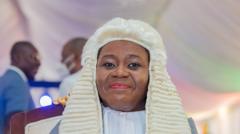In a significant political upheaval, President John Mahama's removal of the country's first female chief justice has ignited a fierce debate about judicial independence in Ghana.
**Ghana's Chief Justice Suspension Sparks Controversy and Allegations of Judicial Overreach**

**Ghana's Chief Justice Suspension Sparks Controversy and Allegations of Judicial Overreach**
Opposition leaders claim the suspension of Chief Justice Gertrude Torkornoo is an unprecedented abuse of executive power.
Ghana's political landscape faces turmoil following the suspension of Chief Justice Gertrude Torkornoo, a move that has been dubbed an "abuse of power" by opposition members. Chief Justice since 2023, Torkornoo's removal marks the first instance of such an action in Ghana's history, prompting intense scrutiny and criticism aimed at President John Mahama.
The allegations leading to Torkornoo's suspension stem from three petitions currently not disclosed to the public; Torkornoo herself has yet to provide an official response. While President Mahama's associates consider the suspension a necessary step toward reforming the judiciary, opposition leaders characterize it as a blatant attempt to "pack the courts" with justices favorable to the ruling National Democratic Congress (NDC).
In a public statement, the presidency clarified that the suspension was intended to facilitate a thorough investigation of the allegations against Torkornoo. In the wake of the announcement, two additional petitions have emerged, compounding the matter's complexity.
Former attorney general Godfred Yeboah Dame criticized the suspension as a "charade" and an egregious overreach that undermines the judiciary's independence. Legal experts have also raised concerns over Mahama's protocol, as he initially failed to provide Torkornoo with the petition details before her suspension, although this was rectified later.
Opposition caucus members argued that Mahama's actions contravened due process by suspending Torkornoo while lawsuits challenging the legality of his decision awaited resolution in the Supreme Court.
However, some Ghanaians support the president's controversial action. Dr. Tony Aidoo, a former ambassador, asserted that Mahama's intervention was necessary to restore integrity to the judiciary, insinuating that Torkornoo's leadership was marred by misconduct.
Torkornoo, Ghana's third female chief justice, previously faced a removal request this year, which was dismissed due to procedural deficiencies. Historically, the role of chief justice is marked by retirement rather than removal; grounds for dismissal are limited to incompetence and misconduct. A five-member committee is now tasked with investigating the newly surfaced allegations against her, as Ghana navigates a pivotal moment in its judiciary's history.
The allegations leading to Torkornoo's suspension stem from three petitions currently not disclosed to the public; Torkornoo herself has yet to provide an official response. While President Mahama's associates consider the suspension a necessary step toward reforming the judiciary, opposition leaders characterize it as a blatant attempt to "pack the courts" with justices favorable to the ruling National Democratic Congress (NDC).
In a public statement, the presidency clarified that the suspension was intended to facilitate a thorough investigation of the allegations against Torkornoo. In the wake of the announcement, two additional petitions have emerged, compounding the matter's complexity.
Former attorney general Godfred Yeboah Dame criticized the suspension as a "charade" and an egregious overreach that undermines the judiciary's independence. Legal experts have also raised concerns over Mahama's protocol, as he initially failed to provide Torkornoo with the petition details before her suspension, although this was rectified later.
Opposition caucus members argued that Mahama's actions contravened due process by suspending Torkornoo while lawsuits challenging the legality of his decision awaited resolution in the Supreme Court.
However, some Ghanaians support the president's controversial action. Dr. Tony Aidoo, a former ambassador, asserted that Mahama's intervention was necessary to restore integrity to the judiciary, insinuating that Torkornoo's leadership was marred by misconduct.
Torkornoo, Ghana's third female chief justice, previously faced a removal request this year, which was dismissed due to procedural deficiencies. Historically, the role of chief justice is marked by retirement rather than removal; grounds for dismissal are limited to incompetence and misconduct. A five-member committee is now tasked with investigating the newly surfaced allegations against her, as Ghana navigates a pivotal moment in its judiciary's history.






















